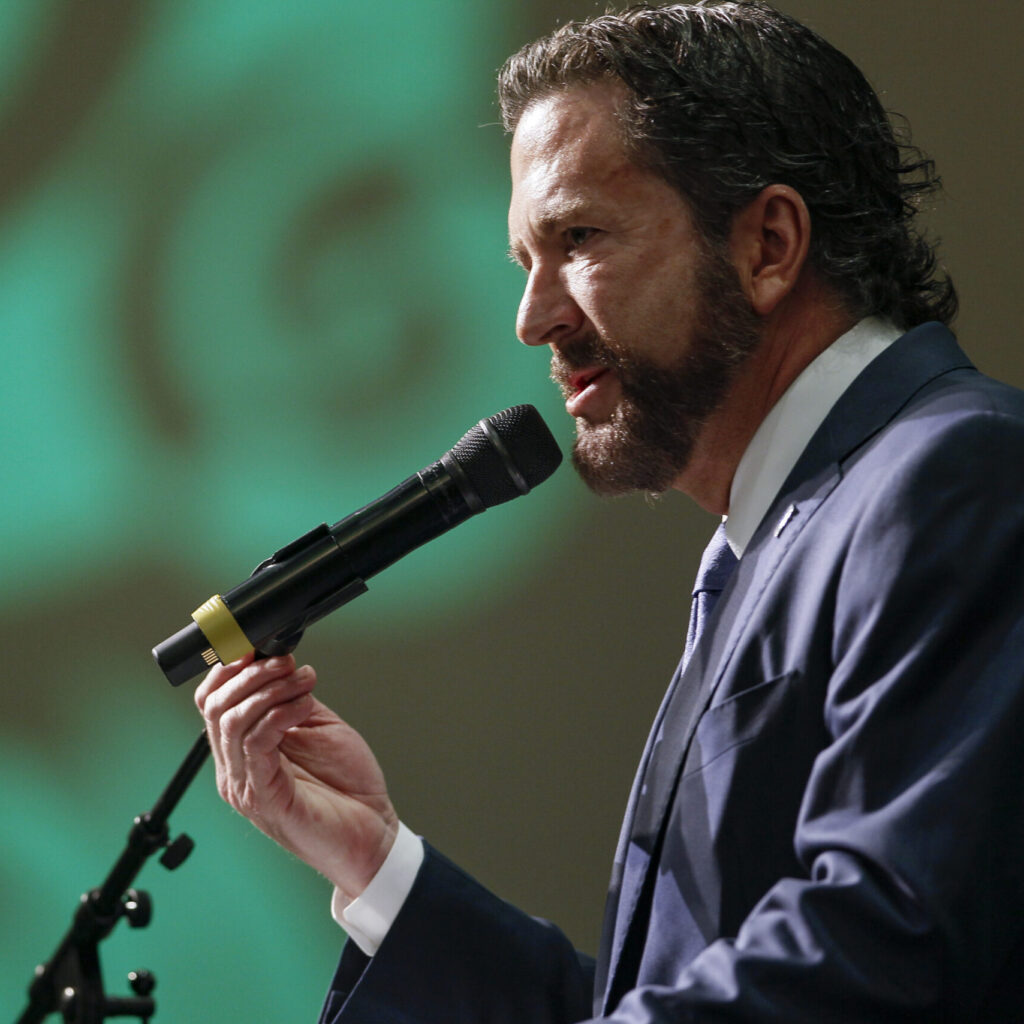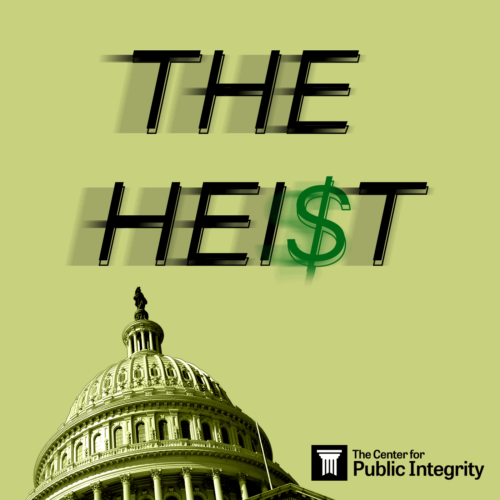Introduction
We spent more than two years digging into the origins and impact of the signature legislative victory of President Donald Trump’s first term, the 2017 tax law. This week, we launched “The Heist,” a five-part podcast that encapsulates and advances that reporting, with fascinating (and sometimes appalling) details about how billions of dollars were transferred from middle class families to a handful of large corporations and billionaires. Subscribe here or where you get your podcasts, and consider leaving a review!
— Matt DeRienzo, editor in chief, mderienzo@publicintegrity.org
THIS EDITION: TAX CUTS
Voters will head to the polls in just 46 days, delivering a referendum on President Donald Trump.
The signature legislative achievement of Trump’s first term was the Tax Cuts and Jobs Act of 2017, which, he has claimed, boosted workers’ wages and created jobs. Critics say it was mostly a huge transfer of wealth to the richest Americans.
In The Heist, a five-episode podcast that launched this week, the Center for Public Integrity digs deep into the tax-cuts law to show who benefited. The podcast is based on a two-year Public Integrity investigation; an episode will be posted every Thursday through Oct. 15.
This week, we introduced podcast subscribers to an influential Republican donor who explains how he withheld campaign donations to goad the Republican-controlled Congress to pass the law, which slashed tax rates for corporations and the wealthy.
“I said ‘Hey, I don’t see any movement on … tax reform,’” said Doug Deason, whose father, Darwin, made a fortune by selling a computer-services company he later sold to Xerox Corp.. “We’re gonna hold back money. We’re canceling fundraisers that we’re doing for some of these politicians.”
Republican lawmakers got the message.
“My donors are basically saying: ‘Get it done or don’t ever call me again,’” Rep. Chris Collins, R-New York, said as Congress was debating the tax-cuts bill. (Collins was convicted this year of insider trading and sentenced to more than two years in prison.)
Deason revealed, in unusually candid fashion, how Washington really works.

“The most surprising aspect of it is that essentially the quiet part got said out loud,” said Eric Shickler, a professor who teaches American politics at the University of California at Berkeley. “That’s just not something that’s usually done. And here it is, at least to some extent, being done right in front of us.”
The point man on Trump’s tax bill was his secretary of the treasury, Steve Mnuchin, who is profiled in the second episode of The Heist.
He followed his father, Robert, to the investment firm Goldman Sachs and later started a hedge fund. With other investors, Mnuchin bought a bank that failed during the 2008 financial crisis and then foreclosed on thousands of mortgages.
Mnuchin became Trump’s campaign finance manager when it was clear Trump would get the Republican nomination for president in 2016. Asked by friends why he signed up with Trump, Mnuchin “said something like, ‘Well, this is a bet, and if I win, I’m going to get a really big prize,” said David Dayen, executive editor of the left-leaning American Prospect and author of a biography on Mnuchin.
In Episode 3, Public Integrity investigates the tax bill’s quick trip through Congress and how the Trump administration claimed the tax cuts would pay for themselves. They didn’t.
Adding $1.5 trillion to the nation’s deficit initially was a sore point for Sen. Bob Corker, a Republican from Tennessee who retired in 2018. Public Integrity examines how Corker, a fiscal conservative, switched positions and chose not to derail the tax bill.
In Episode 4, Public Integrity exposes the fallacy of Republicans’ promises that the law would raise wages and create jobs. We look at American Airlines, which received massive tax breaks but used most of the savings to buy back shares and raise its stock price.
The podcast concludes with an episode showing that loans made through the Paycheck Protection Program, passed by Congress to blunt the effects of the COVID-19 pandemic, went first to the politically well-connected and the wealthy.
“It’s pretty clear that the [loan] process was run in a way that pushed needy small businesses to the back of the line while prioritizing the influential,” said Matthew Gardner, a senior fellow at the nonprofit, non-partisan Institute on Taxation and Economic Policy.
We can’t do this work without your support.
LATEST FROM PUBLIC INTEGRITY
Telemarketer exposed in Public Integrity investigation banned from fundraising
The Federal Trade Commission and four state attorneys general have shut down a New Jersey telemarketer exposed in a 2017 Public Integrity investigation into sham charities that raised millions of dollars that never went to people in need. Mark Gelvan and co-defendants were ordered to pay back more than $58.5 million. From Sarah Kleiner.
House condemns anti-Asian racism after Public Integrity report
The U.S. House of Representatives on Thursday passed a resolution condemning a spike in anti-Asian racism, following a Public Integrity investigation of the problem in the wake of the COVID-19 pandemic. From HuffPost.

Three years. Four disasters. Social workers in Puerto Rico want change
They’re trying to help with the emotional toll from Hurricanes Irma and Maria, earthquakes and now COVID-19. Social workers say they need to be part of the official response. From Kio Herrera.
Factory farming’s government-issued air pollution pass
“Temporary” immunity granted to large industrial farming operations over air pollution violations is now in its 14th year, leaving neighbors who are suffering from the fumes with few options. From Joe Wertz.

Secretive Pentagon program replaces hackers with AI
The military has built a supercomputer system that can automate cyber-warfare, and is debating when to allow it to launch attacks without sign-off from humans. Because its artificial intelligence/machine learning structure is difficult to test, the potential consequences are hard to predict. From Zachary Fryer-Biggs.
OTHERS ON INEQUALITY
- Could land trusts heal segregated cities? Lending practiceslike redlining that discriminate mostly against people of color in specific urban neighborhoods have entrenched poverty and inequality in U.S. cities. An idea with century-old roots could reverse some of the impact: community land trusts to assemble land for the benefit of Black Americans. From The Conversation.
- A massive income shift to the 1%. The median worker should be making as much as $102,000 annually—if some $2.5 trillion weren’t being “reverse distributed” every year away from the working class. From Fast Company.
- Conviction, imprisonment and lost earnings. Encounters with the criminal justice system can depress wages for the entirety of a career. Black and Latino Americans aren’t just incarcerated at a significantly higher rate, they also end up losing more income because of it compared to white people who have also been in prison. From the Brennan Center.
- Faces of Power: In an increasingly diverse country, 80% of top leaders are white. A look at the country’s most powerful institutions, from major corporations, to the military, to the biggest police departments, news organizations and universities, found that leaders are overwhelmingly white. From the New York Times.
- Higher utility costs for people of color. Black, Hispanic, and Native American households spend a much larger portion of their income on energy bills than non-Hispanic white households on average — 43 percent more, 20 percent more, and 45 percent more, respectively. They’re particularly vulnerable as COVID-19-related utility shutoff moratoriums expire. From Grist.
THE RIGHT TO KNOW
A contest for Freedom of Information Act enthusiasts
Public Integrity journalists use the Freedom of Information Act all the time to uncover information that federal, state and local governments are withholding from the public. In fact, we’re among the top three journalism entities in the country over the past 20 years in the number of times we’ve gone to court to make sure the law is enforced. We’re teaming up with MuckRock, an organization that has helped thousands of journalists and citizens use FOIA, on a contest celebrating our new podcast, “The Heist,” which is based on FOIA-driven reporting on the 2017 tax law. The grand prize winner will receive three MuckRock books exploring the FBI’s archives, FOIA-themed cocktail coasters, Public Integrity face masks, and up to an hour of FOIA coaching from the transparency experts at MuckRock and Public Integrity. Enter here!
Read more in Inside Public Integrity
Watchdog newsletter
Words matter: Was the attack on the Capitol a rally, protest or insurrection?
The question remains how history will record the events that resulted in mayhem at the U.S. Capitol.


Join the conversation
Show Comments